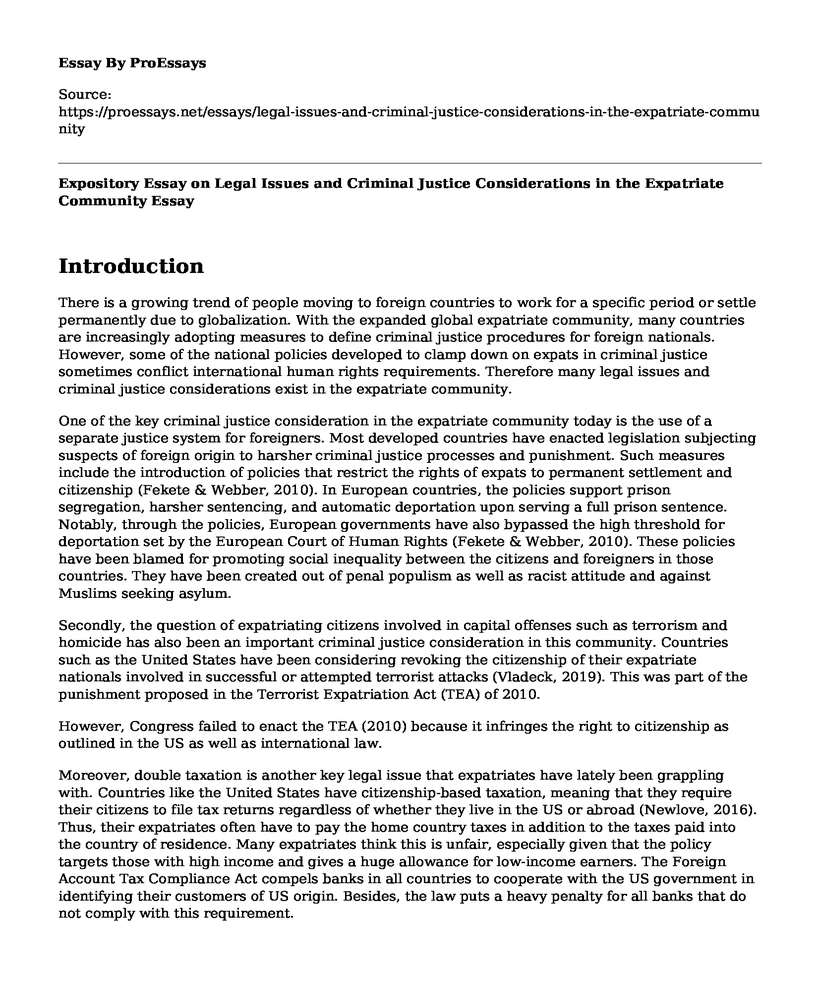Introduction
There is a growing trend of people moving to foreign countries to work for a specific period or settle permanently due to globalization. With the expanded global expatriate community, many countries are increasingly adopting measures to define criminal justice procedures for foreign nationals. However, some of the national policies developed to clamp down on expats in criminal justice sometimes conflict international human rights requirements. Therefore many legal issues and criminal justice considerations exist in the expatriate community.
One of the key criminal justice consideration in the expatriate community today is the use of a separate justice system for foreigners. Most developed countries have enacted legislation subjecting suspects of foreign origin to harsher criminal justice processes and punishment. Such measures include the introduction of policies that restrict the rights of expats to permanent settlement and citizenship (Fekete & Webber, 2010). In European countries, the policies support prison segregation, harsher sentencing, and automatic deportation upon serving a full prison sentence. Notably, through the policies, European governments have also bypassed the high threshold for deportation set by the European Court of Human Rights (Fekete & Webber, 2010). These policies have been blamed for promoting social inequality between the citizens and foreigners in those countries. They have been created out of penal populism as well as racist attitude and against Muslims seeking asylum.
Secondly, the question of expatriating citizens involved in capital offenses such as terrorism and homicide has also been an important criminal justice consideration in this community. Countries such as the United States have been considering revoking the citizenship of their expatriate nationals involved in successful or attempted terrorist attacks (Vladeck, 2019). This was part of the punishment proposed in the Terrorist Expatriation Act (TEA) of 2010.
However, Congress failed to enact the TEA (2010) because it infringes the right to citizenship as outlined in the US as well as international law.
Moreover, double taxation is another key legal issue that expatriates have lately been grappling with. Countries like the United States have citizenship-based taxation, meaning that they require their citizens to file tax returns regardless of whether they live in the US or abroad (Newlove, 2016). Thus, their expatriates often have to pay the home country taxes in addition to the taxes paid into the country of residence. Many expatriates think this is unfair, especially given that the policy targets those with high income and gives a huge allowance for low-income earners. The Foreign Account Tax Compliance Act compels banks in all countries to cooperate with the US government in identifying their customers of US origin. Besides, the law puts a heavy penalty for all banks that do not comply with this requirement.
Therefore, many foreign banks deny US expatriates banking services to avoid the dilemma between infringing the domestic rights of their clients and getting into trouble with the US authorities. Similarly, foreign banks also deny their services to "accidental Americans." Accidental Americans are people born to American parents outside the United States or people born in the US to non-America parents. As a result, this situation has led to the emergence of another legal concern (Newlove, 2016). Many US nationals with high income in foreign countries have lately been making efforts to relinquish their citizenship to avoid the burden of double taxation. However, the process of denouncing original citizenship involves many legal complications because the expats are often required to clear all taxes in arrears before their applications can be considered.
References
Fekete, L., & Webber, F. (2010). Foreign nationals, enemy penology and the criminal justice system. Race & Class, 51(4), 1-25.
Newlove, R. (2016, February 9). Why more Americans are giving up their passports.
Vladeck, S. (2019, March 11). The Deeper Lesson from Terrorist Expatriation Proposals.
Cite this page
Expository Essay on Legal Issues and Criminal Justice Considerations in the Expatriate Community. (2022, Feb 11). Retrieved from https://proessays.net/essays/legal-issues-and-criminal-justice-considerations-in-the-expatriate-community
If you are the original author of this essay and no longer wish to have it published on the ProEssays website, please click below to request its removal:
- Should Certain Crimes be Labeled as Hate Crimes Essay
- Landmark Cases Decided By the U.S. Supreme Court in the 1960s and 1970s
- Laws Relating to Abortion, the Death Penalty, and Assisted Dying Paper Example
- Significant Problems That Transgender Face in the Criminal Justice System
- Essay Example on FBI Struggles to Hire Agents Despite Recruitment Enhancements
- Essay Example on Evolving Labor Movements: Protecting Worker Rights in the U.S.
- Detecting Murder: Exploring the Need to Expand Ideas - Essay Sample







